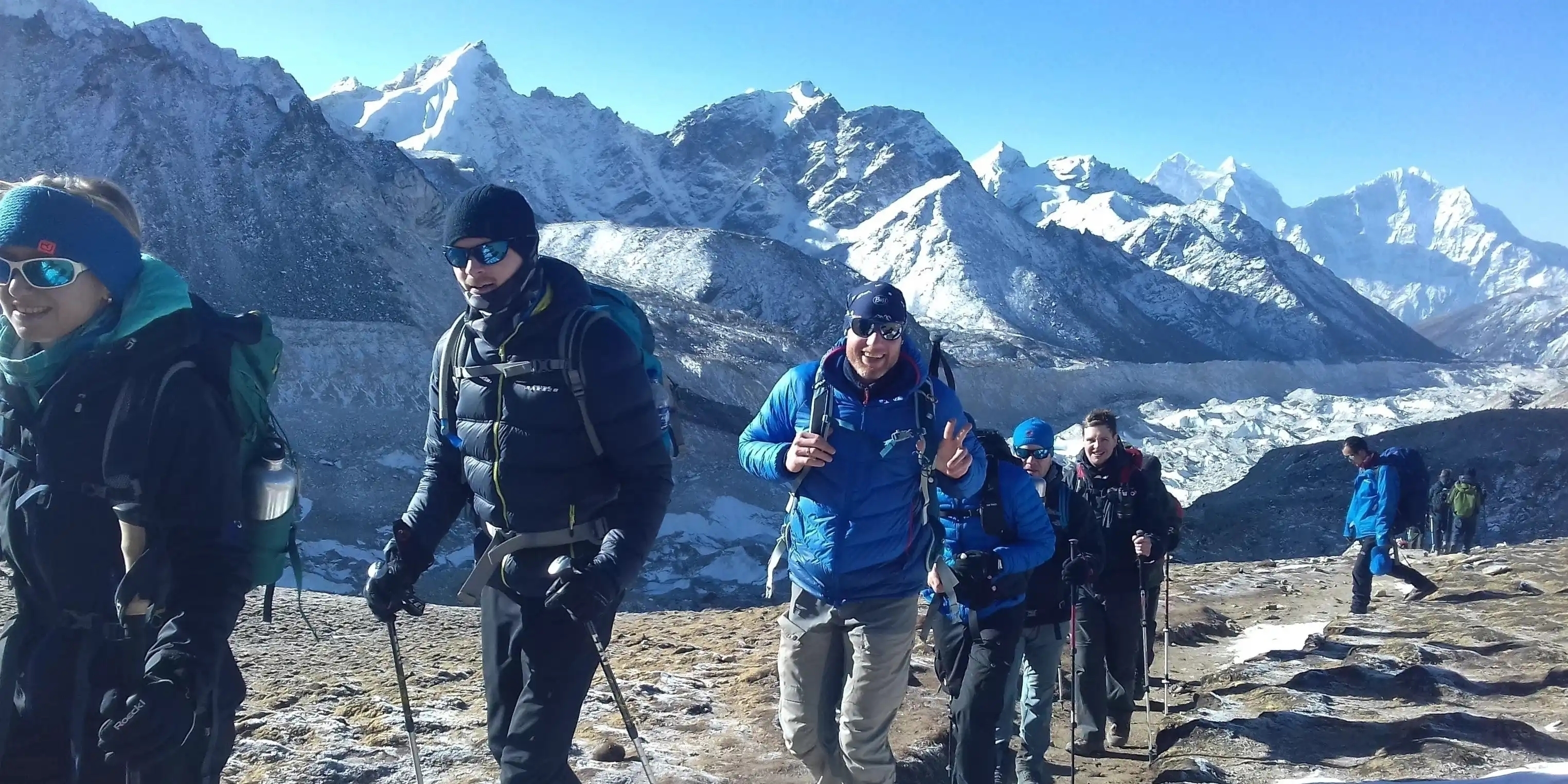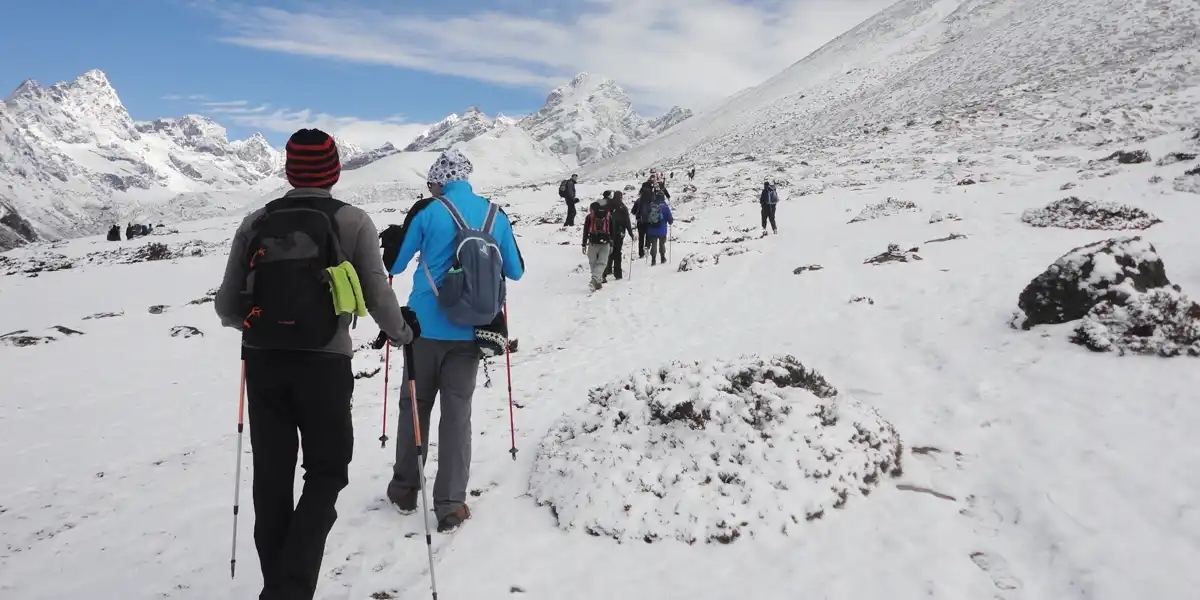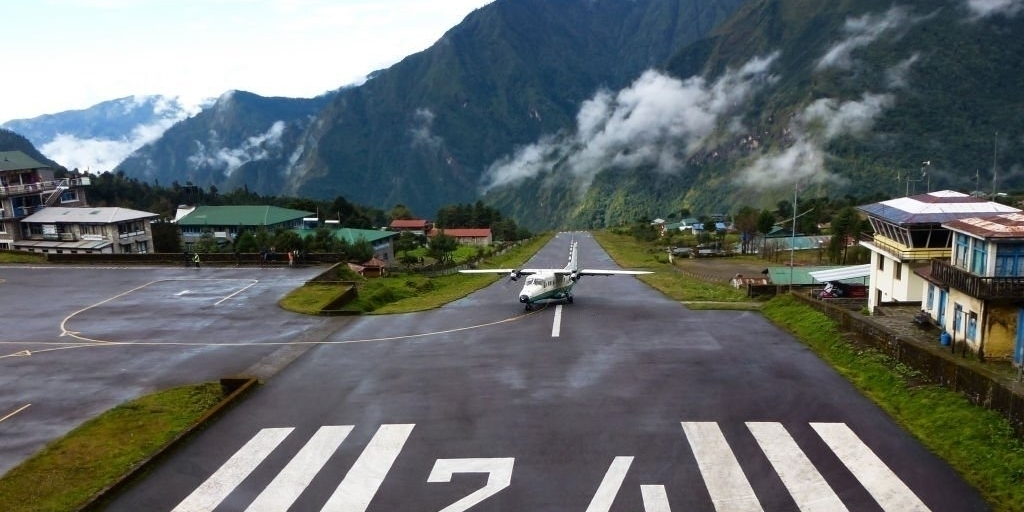EVEREST BASE CAMP TREK DIFFICULTY
On one of the highly preferred treks around Nepal's Himalayas, every traveler dreams of a glimpse of the world's highest peaks. As well as to visit an...


The Everest Base camp trek is considered to bit challenging due to its high altitude and rugged terrain. The Everest base camp trek typically takes around 11 to 15 days to complete. It covers a distance of approximately 132 kilometers for a round trip. Trekkers will ascend to altitudes of over 5 thousand meters, facing altitude sickness, variable weather conditions due to the different months, steep ascents and descents as well as basic lodging and facilities along the trekking route.
The Everest Base camp trek is considered to bit challenging due to its high altitude and rugged terrain. The Everest base camp trek typically takes around 11 to 15 days to complete. It covers a distance of approximately 132 kilometers for a round trip. Trekkers will ascend to altitudes of over 5 thousand meters, facing altitude sickness, variable weather conditions due to the different months, steep ascents and descents as well as basic lodging and facilities along the trekking route to Everest Base Camp
While you are heading for the base camp trekking, it does not require technical climbing skills, it does demand a good level of physical fitness and mental endurance to complete the trek. Proper acclimatization and preparation are essential to minimize risks and enjoy the practice safety.
Whether the Everest base camp trek is worth it largely depends on individual preferences, goals, and expectations. As you wish, many people complete the base camp trek once-in-a-lifetime experience that offers breathtaking views of the world's highest peak Mount Everest. Similarly, fabulous landscape, exceptional cultural encounters with Sherpa societies, and a sense of personal success.
This trek provides an opportunity to immerse oneself in the beauty and majesty of the Himalayas to challenge personal limits. You can gain a deeper understanding of the regions of natural and cultural heritage. It is a chance to step out of one's comfort zone and embark on an adventure that leaves lasting memories.
However, it an important to note that, The Everest Base Camp trek requires watchful planning, physical fitness, and mental preparation. It can be physically challenging in weather conditions. Additionally, the popularity of the trek means that fragments of the trail can be crowded during the high season of trekking in Nepal.
Ultimately, for those who are drawn to the allure of Mount Everest and Nepal Himalayas, The Everest base camp Trek can be a massively fulfilling and unforgettable knowledge, making it well worth the effort for many journeys.
The Everest Base Camp Trek presents certain risks and challenges, but if you are with proper preparation and safety guidelines, it can be undertaken relatively safely. Some of the potential dangers associated with the trek include Altitude sickness, Terrain, Remote locations, Avalanches or landslides, and weather conditions. Despite this risk, thousands of trekkers complete the Everest Base camp trek each year.
Yes, the Everest Base Camp Trek involves a section of steep terrain, particularly as you ascend toward higher altitudes. The trek includes a variety of landscapes from relatively gentle slopes to steep ascents and descents, especially as you approach key points such as Namche Bazaar, Tengboche, Dingboche Loboche, and Gorakshep. Some parts of the trail feature steep staircases rocky paths, and narrow trails carved into the mountainside.
Travelers should be prepared for uphill climbs and downhill descents, which can be physically demanding. Specially, at a high Altitude, you should follow these types of rules, proper pacing, rest breaks, and hydration are important strategies for managing the steep section of the Everest Base Camp Trek.
The Everest Base Camp Trek is generally not recommended for absolute beginners with no prior hiking or trekking experience. While it does not require technical climbing skills, it does demand a certain level of physical fitness, endurance, and mental resilience due to the high altitude and challenging terrain. For some people who are new to trekking, it is advisable to start with shorter and less demanding treks in more accessible locations to gain experience and assess one's fitness level and comfort with outdoor adventures. As one builds experience, fitness, and confidence, they can gradually progress to more challenging treks like Everest Base Camp, Or other Trekking in Nepal.
However, if you prepare properly, with training, and guidance from experienced guides, some beginners with good fitness and determination may complete the Everest Base camp.
While you are planning to go to the Everest base camp trek, you may think of several factors for completing the trekking. Firstly, your plan should be for the normal season of trekking in Nepal. Offseason time you could not complete. Some factors I would like to suggest below:
Altitude Sickness: Altitude sickness is a significant concern when trekking to high altitudes. Trekking with others allows for mutual monitoring and support in case symptoms of altitude sickness.
Enjoyment: Trekking with guides or porters can enhance the overall experience by providing detailed information, locality, companionship, shared experiences, and opportunities for social interaction.
Safety: Trekking alone means it is self-riskier and if you are in emergencies like injuries, trekking path loss, and altitude sickness it will be hazardous. Having a trekking partner or joining a guided group can provide added safety and support.
Logistics: Organizing permits, accommodations in trekking routes, transportation, and other logistics can be challenging, especially for solo travelers. Joining a guided trek or a group tour can be helpful and simplify these arrangements.
If you choose to trek to Everest base Camp alone, it is crucial to research and prepare the necessary goods, and time, prepare for acclimatization. You have to ensure appropriate gear and equipment, familiarizing yourself with safety protocols. Additionally informing someone trustworthy about your plans and itinerary is essential for safety purposes. However, for most individual trekkers with reputable guide or joining a guided group tour is recommended for a safer and more enjoyable experience.
The Everest Base Camp trek typically starts from Lukla. Lukla is a small town in the Khumbu region of northeast Nepal. Lukla is accessible by a short flight from Kathmandu, the capital city of Nepal. Some of the trekkers start from Jiri go up to Phakding and head towards to Everest base camp. From Lukla, trekkers begin their journey on foot, following the well-established trail that passes through Many Sherpa Villages, Buddhist Monasteries, and scenic landscapes as they make their way towards Everest Base Camp.
The cost of the Everest Base Camp Trek can vary depending on several factors such as the duration of the trek. The Services included the season of travel and the provider you choose by yourself.
On average, for a standard 12-to-14-day trek with a reputable trekking agency or guide, you can expect to pay anywhere from $1,100/- to $3500/- per person. This cost usually includes permits and domestic flights to and from Lukla. All the Accommodation, meals guide, and porter services, and sometimes additional amenities such as medical kits and oxygen cylinders.
Keep in mind that prices may fluctuate based on the level of comfort and services you prefer as well as any additional activities or side trips you may choose to include. It is important to research and equivalence diverse trekking agencies or guides to find the best selection that fits your budget and partialities while guaranteeing safety and quality services.
Additionally, consider factors like tipping for guides and porters, individual gear rental or obtaining travel coverage, and other Miscellaneous expenses when planning for the Everest Base Camp trek.
There are plentiful trekking agencies and tour operatives that offer Everest Base Camp trek packages, catering to a range of budgets and performances. These packages typically include all necessary provisions for the trek, such as permits, accommodation, meal transport, guide, and porter facilities, and sometimes extra amenities like medical kits and oxygen cylinders.
The Specifics of each package can vary, so it is carefully review what is included and not included in your package and the many optional add-ons or upgrades available.
Additionally, consider factors are the reputation and experience of the trekking operator and company. The quality of services provided and customer reviews when choosing a package. The importance of the cost for Everest Base camp trek safety, reliability, quality of service, etc.
The length of the Everest base camp trek is around 80 miles/130 kilometers. Which will take around 11 to 14 days to complete in a round trip.
However, some trekkers want longer itineraries because they want additional acclimatization days or side trips to nearby attractions like Gokyo Valley, Thame Village, Everest View Hotel, and Khumjung Village. Conversely, some people may choose shorter itineraries for a faster ascent and decent due to their time boundary. To do faster trekking need to fit in and higher level of hiking experience.
The Everest Base Camp trek is a breathtaking journey that takes you to the spectacular landscape on Earth. This trek starts from Lukla, you will trek through picturesque Sherpa villages, lush forests, and high-quality mountain passes.
The journey is challenging yet immensely rewarding offering a mix of physical exertion, cultural immersion, and natural beauty, along the way, you will encounter Buddhist monasteries prayer flags fluttering in the wind, and friendly locals who call the region home.

On one of the highly preferred treks around Nepal's Himalayas, every traveler dreams of a glimpse of the world's highest peaks. As well as to visit an...

The Annapurna Himalaya Range is a popular trekking destination in Nepal and is known for its stunning views of the Himalayas. This trek is s...

The complete Everest Base Camp Trek CostIn Nepal, one of the most thrilling trekking experiences in the world, Everest Base Camp Trek fascinates thous...

The Everest Base Camp (EBC) trek with Island Peak climbing is a dream adventure for many avid trekkers and mountaineers. It combines the breathtaking...

Embarking on the awe-inspiring journey of the Everest base camp trek with island peak climbing is a dream for adventure enthusiasts. This blog post li...

Everest Base Camp Trek Itinerary is a planned schedule outlining the Activities, routes, and duration of trekking to the base camp of Everest. People...
